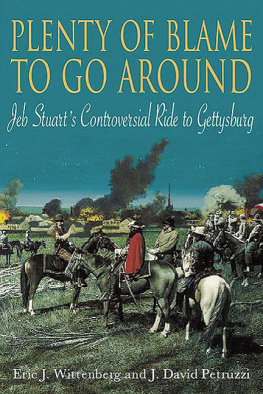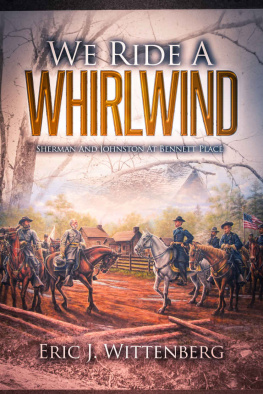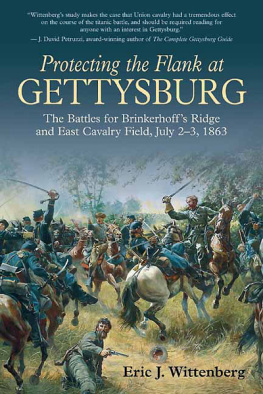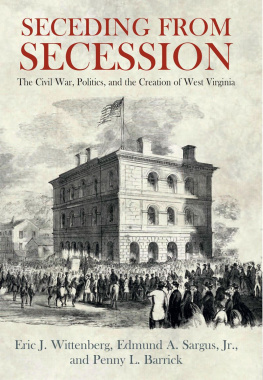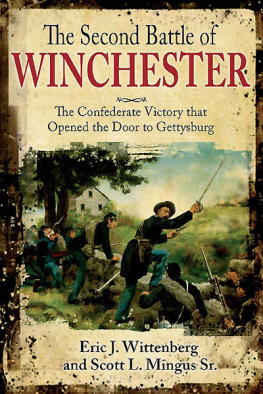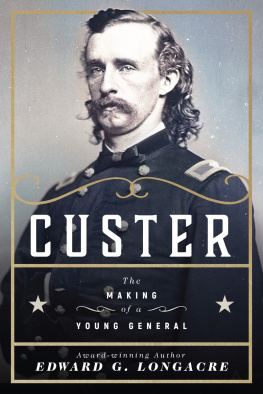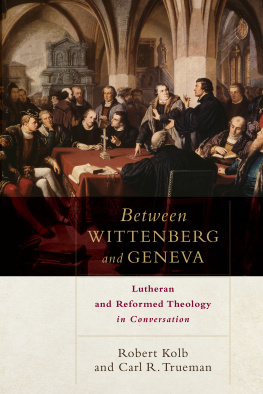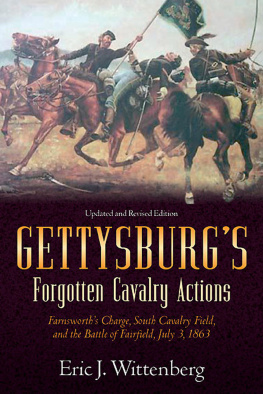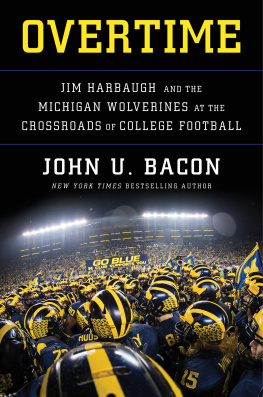ONE OF CUSTERS WOLVERINES
ONE OF CUSTERS
WOLVERINES
The Civil War Letters of
Brevet Brigadier General James H. Kidd,
6th Michigan Cavalry
edited by
Eric J. Wittenberg
THE KENT STATE UNIVERSITY PRESS
Kent, Ohio, and London
2000 by Eric J. Wittenberg
All rights reserved
Library of Congress Catalog Card Number 00-035635
ISBN 0-87338-670-1
Manufactured in the United States of America
04 03 02 01 00 5 4 3 2 1
Library of Congress Cataloging-in-Publication Data
Kidd, James Harvey, 18401913
One of Custers Wolverines: the Civil War Letters of Brevet Brigadier General James H. Kidd, 6th Michigan Cavalry / edited by Eric J. Wittenberg.
p. cm.
Includes bibliographical references and index.
ISBN 0-87338-670-1 (alk. paper)
I. Kidd, James Harvey, 18401913Correspondence. 2. United States. Army. Michigan Cavalry Regiment, 6th (18621865) 3. United StatesHistoryCivil War, 18611865Personal narratives. 4. MichiganHistoryCivil War, 18611865Personal narratives. 5. United StatesHistoryCivil War, 18611865Regimental histories. 6. MichiganHistoryCivil War, 18611865Regimental histories. 7. United StatesHistoryCivil War, 18611865Cavalry operations. 8. SoldiersMichiganCorrespondence. I. Wittenberg, Eric J., 1961 II. Title.
E514.6 6th .K44 2000
British Library Cataloging-in-Publication data are available.
Frontispiece: Capt. James H. Kidd, age twenty-two years. This photograph was likely taken not long after he received his commission in the 6th Michigan Cavalry in fall 1862. Courtesy of the Bentley Historical Library, University of Michigan, Ann Arbor.
War must be carried on systematically, and to do it you must have men of character activated by principles of honor.
Gen. George Washington (17321799)
If officers desire to have control over their commands, they must remain habitually with them, industriously attend to their instruction and comfort, and in battle lead them well.
Lt. Gen. Thomas J. Stonewall Jackson,
Letter of Instruction to Commanding Officers,
November 1861
In a great, momentous struggle it is character that tells. I do not mean simply nor chiefly bravery. Many a man has that, who may become surprised or disconcerted at a sudden change in the posture of affairs. What I mean by character is a firm seasoned substance of soul. I mean such qualities or acquirements as intelligence, thoughtfulness, conscientiousness, rightmindedness, patience, fortitude, long-suffering and unconquerable resolve.
Maj. Gen. Joshua L. Chamberlain,
on the dedication of the 20th Maine Monument at Gettysburg,
October 3, 1893
The cavalry constitute the eyes and ears of the army. The safety of the entire command depends upon their vigilance and the faithfulness of their reports.
Lt. Gen. Daniel Harvey Hill to his troops,
February 25, 1863
But foremost in the fight youll see
Whereer the bravest dare be,
The sabres of thy cavalry
Michigan, my Michigan
From the Michigan Cavalry
Brigade Monument on
East Cavalry Field, Gettysburg
THIS BOOK IS RESPECTFULLY DEDICATED to the men of the Michigan Cavalry Brigade of the First and Third Divisions, Cavalry Corps, Army of the Potomac and Army of the Shenandoah. It is also respectfully dedicated to the memory of James Harvey Kidd, who documented their exploits so thoroughly and so lovingly and fittingly, further to those who remember the trials and tribulations of these men today. Finally, I lovingly dedicate this book to my wife and best friend, Susan Skilken Wittenberg, without whose patience, support, and assistance it would not have been possible.
Contents
Rightly or wrongly, George Armstrong Custer has been a fixture in the collective American consciousness for almost a century and a half. As a result of the tragic end he met on the Little Big Horn in 1876, he is primarily remembered for his post-Civil War exploits. In recent years, however, historians have focused on Custers pivotal role in winning the American Civil War. That attention, in turn, has brought to light the accomplishments of the command most closely associated with him, the Michigan Cavalry Brigade. Made up of four fine regiments of veteran volunteer cavalry, the Michigan Brigade fought hard throughout the war, gaining undying fame in the process. Custers Wolverines, as they called themselves, left behind a sterling record of service, engaging in more than sixty battles and skirmishes during their career with the Army of the Potomac. By the end of the war, the Michigan Cavalry Brigade was, perhaps, the finest single cavalry brigade in servicefor the Union or the Confederacy. It was certainly the most famous, perhaps as a result of the Custer connection.
James Harvey Kidd of the 6th Michigan Cavalry, who began the war as a twenty-one-year-old college student and ended it as a twenty-five-year-old colonel, was a fine example of the sort of men who followed Custers lead. Not long after the end of the war, the young horse soldier received a brevet to brigadier general, a remarkable accomplishment for a man who was not a West Pointer. A newspaperman by trade and training, Kidd had a true gift for the written word, bringing a reporters keen sense of observation to his writings. Throughout the war, Kidd wrote long, informational letters home to his parents and family. It is fortunate that those letters have been preserved and remain available to the modem historian. Kidd also wrote an outstanding memoir, Personal Recollections of a Cavalryman in Custers Michigan Brigade in the Civil War; wrote a brief early biography of George Custer; and frequently lectured at various veterans events.
I found Kidds letters in the course of researching the June 1864 Battle of Trevilian Station, wherein Kidds command played a major role. After reading several of the letters, I realized that this story needed to be told. My purpose here is twofold. First and foremost, the letters tell the story of a young mans participation in the greatest adventure of his life. Second, through the letters, Kidds numerous postwar writings, and the words of others, I hope to portray some sense of the life of one of Custers most loyal followers. This book is not intended to be a definitive biography of James H. Kidd. Instead, I have included all of Kidds letters home describing his military service. The letters paint a picture of a close-knit family separated because of young Jamess sense of duty. Kidds keen powers of observation and his ability to translate those observations into written words help us to understand the ordeals suffered by the men who fought and died during the American Civil War.
An appendix provides a complete itinerary of the actions, engagements, skirmishes, and raids of the 6th Michigan Cavalry, presented here for the first time. Many of Kidds other writings about his experiences in the American Civil War will appear in the forthcoming companion volume to this book, At Custers Side: The Civil War Writings of Bvt. Brig. Gen. James H. Kidd.
A number of the letters sent to Kidd by various family members in the years 1864 and 1865 survive, and, where appropriate, I have included excerpts of those letters in the narrative. Kidds diary for a portion of 1864 and for most of the second half of 1865 also survives. No other work has utilized this insightful little tome, and I have used it to supplement the narrative, particularly in the section dealing with Kidds unhappy service in the Far West during the months immediately following the Civil War. Finally, I have extracted some especially enlightening examples of Kidds command style from the regimental order books of the 6th Michigan Cavalry.



